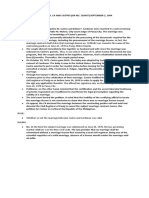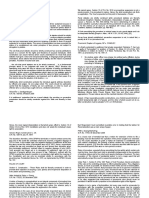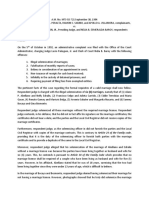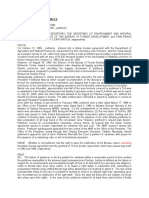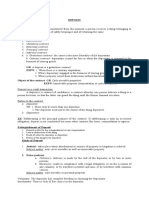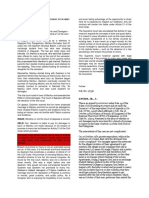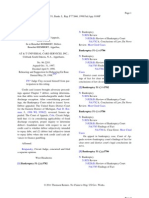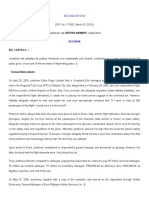Gashem Shookat Baksh V CA
Gashem Shookat Baksh V CA
Uploaded by
chelsimaineCopyright:
Available Formats
Gashem Shookat Baksh V CA
Gashem Shookat Baksh V CA
Uploaded by
chelsimaineOriginal Description:
Original Title
Copyright
Available Formats
Share this document
Did you find this document useful?
Is this content inappropriate?
Copyright:
Available Formats
Gashem Shookat Baksh V CA
Gashem Shookat Baksh V CA
Uploaded by
chelsimaineCopyright:
Available Formats
Gashem Shookat Baksh vs.
CA
G.R. No. 97336, 19 February 1993
FACTS:
In August 1986, while working as a waitress in Dagupan City, Pangasinan,
Marilou Gonzales, then 21 years old, met Gashem Shookat Baksh, a 29 year old
exchange student from Iran who was studying medicine in Dagupan. The two got really
close and intimate. On Marilous account, she said that Gashem later offered to marry
her at the end of the semester. Marilou then introduced Gashem to her parents where
they expressed their intention to get married. Marilous parents then started inviting
sponsors and relatives to the wedding. Meanwhile, Marilou started living with Gashem
in his apartment where they had sexual intercourse. But in no time, their relationship
went sour as Gashem began maltreating Marilou. Gashem eventually revoked his
promise of marrying Marilou and he told her that he is already married to someone in
Bacolod City. Marilou went home and later sued Gashem for damages. The trial court
ruled in favor of Marilou and awarded her P20k in moral damages. The Court of Appeals
affirmed the decision of the trial court. On appeal, Gashem averred that he never
proposed marriage to Marilou and that he cannot be adjudged to have violated Filipino
customs and traditions since he, being an Iranian, was not familiar with Filipino customs
and traditions.
ISSUE:
Whether or not the Court of Appeals is correct.
HELD:
Yes. Gashem is liable to pay for damages in favor of Marilou not really because of
his breach of promise to marry her but based on Article 21 of the Civil Code which
provides: Any person who wilfully causes loss or injury to another in a manner that is
contrary to morals, good customs or public policy shall compensate the latter for the
damage. Breach of promise to marry is not an actionable wrong per se. In this case, it is
the deceit and fraud employed by Gashem that constitutes a violation of Article 21 of
the Civil Code. Gashems blatant disregard of Filipino traditions on marriage and on the
reputation of Filipinas is contrary to morals, good customs, and public policy. The
Supreme Court also elucidated that Article 21 was meant to expand the concepts of
torts and quasi delict. It is meant to cover situations such as this case where the breach
complained of is not strictly covered by existing laws. It was meant as a legal remedy for
the untold number of moral wrongs which is impossible for human foresight to
specifically enumerate and punish in the statute books such as the absence of a law
penalizing a the breach of promise to marry.
You might also like
- Sample Motion To Vacate Judgment Under Rule 60 (B)Document3 pagesSample Motion To Vacate Judgment Under Rule 60 (B)Stan Burman100% (1)
- SUSPENSION, DISBARMENT and DISCIPLINE of LAWYERSDocument36 pagesSUSPENSION, DISBARMENT and DISCIPLINE of LAWYERSLexie Gabriana-Reyes100% (6)
- Ra 10172Document5 pagesRa 10172Matthew DiazNo ratings yet
- 3 Aguila, JR V CaDocument8 pages3 Aguila, JR V CaTeps RaccaNo ratings yet
- dISPUTABLE PRESUMPTIONSDocument2 pagesdISPUTABLE PRESUMPTIONSahleksieNo ratings yet
- II. K. 2. Briones v. MiguelDocument2 pagesII. K. 2. Briones v. MiguelEr BurgosNo ratings yet
- Preliminary ProvisionsDocument149 pagesPreliminary Provisions私は 花No ratings yet
- Family Code CasesDocument9 pagesFamily Code CasesShayne MadeloNo ratings yet
- Fam Code CasesDocument22 pagesFam Code CasesButternut23No ratings yet
- Baccay Vs BaccayDocument12 pagesBaccay Vs BaccayChristopher Joselle Molato100% (1)
- Rodriguez v. Borja: G.R. No. L-21993 June 21, 1966Document67 pagesRodriguez v. Borja: G.R. No. L-21993 June 21, 1966Shiela Mae OblanNo ratings yet
- Succession BarQDocument39 pagesSuccession BarQSHERYL PARADERONo ratings yet
- PNB v. QuintosDocument1 pagePNB v. QuintosMichaelVillalon0% (1)
- Ra 10863Document33 pagesRa 10863Joel TisaraNo ratings yet
- 002 - Carmen Quimiguing vs. Felix Icao, GR. No. 26795 July 31, 1970Document1 page002 - Carmen Quimiguing vs. Felix Icao, GR. No. 26795 July 31, 1970Ana JuanitoNo ratings yet
- Key Take - Away or Doctrine To RememberDocument2 pagesKey Take - Away or Doctrine To Remembernicole hinanayNo ratings yet
- Bar QuestionsDocument13 pagesBar QuestionsAllyne Bello BoyonganNo ratings yet
- Incorporation FacilitatedDocument5 pagesIncorporation FacilitatedMarc Aderades LaureanoNo ratings yet
- Citizenship NotesDocument3 pagesCitizenship NotesShinji NishikawaNo ratings yet
- Title Xii Deposit: Deposit in General and Its Different KindsDocument45 pagesTitle Xii Deposit: Deposit in General and Its Different KindsArmiNo ratings yet
- Wills and Succession CasesDocument21 pagesWills and Succession CasesDaryll Phoebe EbreoNo ratings yet
- Principle of Non-RegressionDocument5 pagesPrinciple of Non-RegressionLawDroidNo ratings yet
- STATCON (Finals) - 1E Construction of Particular Statutes People v. TemporadaDocument17 pagesSTATCON (Finals) - 1E Construction of Particular Statutes People v. TemporadaBernice RosarioNo ratings yet
- Civil DigestsDocument80 pagesCivil DigestsGracia Bocala FuentesNo ratings yet
- Nikko Hotel Manila Garden Vs Roberto ReyesDocument20 pagesNikko Hotel Manila Garden Vs Roberto ReyesJes MinNo ratings yet
- 17 Aguila, Jr. vs. Court of AppealsDocument11 pages17 Aguila, Jr. vs. Court of AppealsYaz CarlomanNo ratings yet
- Cacho V People Digest 1Document2 pagesCacho V People Digest 1Onireblabas Yor OsicranNo ratings yet
- Holy Spirit Homeowners Association, Inc. Vs Secretary Michael DefensorDocument69 pagesHoly Spirit Homeowners Association, Inc. Vs Secretary Michael DefensortinsanchNo ratings yet
- PFR Cases ACP OnwardsDocument7 pagesPFR Cases ACP Onwardsomerpacilan0205No ratings yet
- Chapter 1: Concept of Property A. Why Does Our Society Recognize Property?Document18 pagesChapter 1: Concept of Property A. Why Does Our Society Recognize Property?Jennifer DoeNo ratings yet
- G.R. No. 193493Document3 pagesG.R. No. 193493Morin OcoNo ratings yet
- Cosca V Palaypon Digest (Ong)Document3 pagesCosca V Palaypon Digest (Ong)Yodh Jamin OngNo ratings yet
- Quiz CJSKeyDocument3 pagesQuiz CJSKeyRalugers YadilohNo ratings yet
- Succession Outline Notes CasesDocument141 pagesSuccession Outline Notes CasesEnerz CerillesNo ratings yet
- Borromeo-Herrera Vs BorromeoDocument8 pagesBorromeo-Herrera Vs BorromeoStephanie ValentineNo ratings yet
- Facts:: MA. ARMIDA PEREZ-FERRARIS v. BRIX FERRARIS, GR NO. 162368, 2006-07-17Document2 pagesFacts:: MA. ARMIDA PEREZ-FERRARIS v. BRIX FERRARIS, GR NO. 162368, 2006-07-17ron dominic dagumNo ratings yet
- Various Cases in Property LawDocument11 pagesVarious Cases in Property LawMaria Danice AngelaNo ratings yet
- Family Relations - San Luis v. San Luis (CJ CARABBACAN)Document2 pagesFamily Relations - San Luis v. San Luis (CJ CARABBACAN)juna luz latigayNo ratings yet
- PFR Week 3 Case DigestsDocument18 pagesPFR Week 3 Case DigestsTrixie ArciagaNo ratings yet
- CLJ5 Group AssignmentsDocument38 pagesCLJ5 Group AssignmentsNelson AbbuNo ratings yet
- Civ Rev 1 Week 9 DigestsDocument9 pagesCiv Rev 1 Week 9 DigestsAustine Clarese VelascoNo ratings yet
- SSS v. Jarque Vda. de BailonDocument9 pagesSSS v. Jarque Vda. de Bailonkristian datinguinooNo ratings yet
- Income Taxation of Individuals: Citizens: Resident Non-Residents CitizensDocument2 pagesIncome Taxation of Individuals: Citizens: Resident Non-Residents CitizenshellomynameisNo ratings yet
- How To Answer Short EssaysDocument41 pagesHow To Answer Short EssaysJan Cyril Bulawan DelfinNo ratings yet
- Transportation LawDocument85 pagesTransportation LawAshaselenaNo ratings yet
- Arcaba vs. Tabancura Vda de Batocael GR No. 146683, November 22, 2001Document9 pagesArcaba vs. Tabancura Vda de Batocael GR No. 146683, November 22, 2001Jaymih Santos AbasoloNo ratings yet
- PFR Cases 3Document13 pagesPFR Cases 3Jessica Joyce PenalosaNo ratings yet
- Cases in Nat ResDocument98 pagesCases in Nat ResJoyceNo ratings yet
- Persons Case DoctrineDocument10 pagesPersons Case DoctrineDixie Amor PanesNo ratings yet
- Spouses Medina Vs Dr. Venancia L. Makabali (1969)Document2 pagesSpouses Medina Vs Dr. Venancia L. Makabali (1969)Uc ItlawNo ratings yet
- Van Dorn vs. Romillo, G.R. No. L - 68470Document4 pagesVan Dorn vs. Romillo, G.R. No. L - 68470Jonjon BeeNo ratings yet
- Kasilag V RodriguezDocument1 pageKasilag V RodriguezPhil Alkofero Lim AbrogarNo ratings yet
- Ladia NotesDocument125 pagesLadia NotesAngel VirayNo ratings yet
- G.R. No. 225409Document15 pagesG.R. No. 225409Ann ChanNo ratings yet
- Credit Trans Notes 01Document4 pagesCredit Trans Notes 01Lara Theresa SudarioNo ratings yet
- Fernandez Vs CA - DigestDocument1 pageFernandez Vs CA - DigestChristopher Joselle MolatoNo ratings yet
- Republic vs. CA & MolinaDocument2 pagesRepublic vs. CA & Molinard100% (1)
- Baksh V CaDocument2 pagesBaksh V Cakenth uyNo ratings yet
- Baksh vs. CADocument2 pagesBaksh vs. CAgleeNo ratings yet
- Gashem Shookat Baksh Vs Court of AppealsDocument1 pageGashem Shookat Baksh Vs Court of AppealsJames WilliamNo ratings yet
- Gashem Shookat Baksh, Petitioner vs. Hon. Court of Appeals and Marilou T. Gonzales, RespondentsDocument1 pageGashem Shookat Baksh, Petitioner vs. Hon. Court of Appeals and Marilou T. Gonzales, RespondentsRegion 6 MTCC Branch 3 Roxas City, CapizNo ratings yet
- Actions For Breach of Promise To MarryDocument8 pagesActions For Breach of Promise To MarryPierreNo ratings yet
- Oblicon CasesDocument11 pagesOblicon Caseschelsimaine100% (1)
- De Roy V CADocument1 pageDe Roy V CAchelsimaineNo ratings yet
- Separation of Prop CasesDocument16 pagesSeparation of Prop CaseschelsimaineNo ratings yet
- San Luis V San LuisDocument1 pageSan Luis V San LuischelsimaineNo ratings yet
- People vs. Licera G.R. No. L-39990, 2 July 1975 FactsDocument1 pagePeople vs. Licera G.R. No. L-39990, 2 July 1975 FactschelsimaineNo ratings yet
- Cui V Arellano UniversityDocument1 pageCui V Arellano UniversitychelsimaineNo ratings yet
- Valeroso vs. People G.R. No. 164815, 22 February 2008 FactsDocument1 pageValeroso vs. People G.R. No. 164815, 22 February 2008 FactschelsimaineNo ratings yet
- Globe Mackay Cable Vs CADocument1 pageGlobe Mackay Cable Vs CAchelsimaineNo ratings yet
- DM Consunji, Inc. vs. Court of Appeals G.R. No. 137873, 20 April 2001 FactsDocument1 pageDM Consunji, Inc. vs. Court of Appeals G.R. No. 137873, 20 April 2001 FactschelsimaineNo ratings yet
- CIR V PhilHealthDocument1 pageCIR V PhilHealthchelsimaineNo ratings yet
- Pevspe 5 Scra 200 Facts:: Contrary To Morals, Good Customs or Public Policy Shall Compensate The Latter For The Damage."Document1 pagePevspe 5 Scra 200 Facts:: Contrary To Morals, Good Customs or Public Policy Shall Compensate The Latter For The Damage."chelsimaineNo ratings yet
- Harper & Row v. Nation EnterprisesDocument1 pageHarper & Row v. Nation EnterprisesJoe Cura100% (1)
- Ponce Vs Alsons CementDocument2 pagesPonce Vs Alsons CementMarkJobelleMantillaNo ratings yet
- Pot Lawsuit Reply DefsDocument17 pagesPot Lawsuit Reply Defsray sternNo ratings yet
- LLM (Intellectual Property Rights) PDFDocument24 pagesLLM (Intellectual Property Rights) PDFJayesh Shah0% (1)
- 01 Legal Edge 2018 PreWeek - PoliticalDocument27 pages01 Legal Edge 2018 PreWeek - PoliticalJustin ParasNo ratings yet
- House Hearing, 105TH Congress - Independent Counsel ReportDocument127 pagesHouse Hearing, 105TH Congress - Independent Counsel ReportScribd Government DocsNo ratings yet
- International Arbitration vs. International Adjudication For The Settlement of Disputes Between States and International OrganizationsDocument23 pagesInternational Arbitration vs. International Adjudication For The Settlement of Disputes Between States and International OrganizationsShahriar Yeasin KhanNo ratings yet
- Art 11 Villavert Vs DesiertoDocument5 pagesArt 11 Villavert Vs DesiertochacharapchacharapNo ratings yet
- Foreclosure: Res Judicata Lays The Rule That An Existing Final Judgment orDocument2 pagesForeclosure: Res Judicata Lays The Rule That An Existing Final Judgment orJoyceNo ratings yet
- Anjana's ResumeDocument2 pagesAnjana's ResumeKaitlin WilliamsNo ratings yet
- Regina (Bradley and Others) v. Secretary of State For Work and PensionsDocument92 pagesRegina (Bradley and Others) v. Secretary of State For Work and PensionsClerkBeanJNo ratings yet
- Objection To Substitution of Plaintiff 110801Document6 pagesObjection To Substitution of Plaintiff 110801Robert Lee Chaney100% (1)
- Full Title: Dario Nacar Vs - Gallery Frames And/Or Felipe Bordey, JR., STATEMENT OF FACTS Petitioner Dario Nacar Filed A Complaint BeforeDocument3 pagesFull Title: Dario Nacar Vs - Gallery Frames And/Or Felipe Bordey, JR., STATEMENT OF FACTS Petitioner Dario Nacar Filed A Complaint BeforeJuan Carlo CastanedaNo ratings yet
- Order Granting Plaintiff'S Motion For Summary Judgment and Denying Defendants' Motion For Summary JudgmentDocument6 pagesOrder Granting Plaintiff'S Motion For Summary Judgment and Denying Defendants' Motion For Summary JudgmentEriq GardnerNo ratings yet
- In Re Remert 141 F.3d 277Document10 pagesIn Re Remert 141 F.3d 277Thalia SandersNo ratings yet
- Functions of High Court in Pakistan: Submitted ToDocument11 pagesFunctions of High Court in Pakistan: Submitted ToMuniba ArshadNo ratings yet
- Legal Research PEMBERTON Vs DE LIMA G.R. No. 217508 PDFDocument15 pagesLegal Research PEMBERTON Vs DE LIMA G.R. No. 217508 PDFBrenda de la GenteNo ratings yet
- Lhuillier v. British Airways, G.R. No. 171092, (March 15, 2010), 629 PHIL 365-384Document10 pagesLhuillier v. British Airways, G.R. No. 171092, (March 15, 2010), 629 PHIL 365-384Hershey Delos SantosNo ratings yet
- Paderanga vs. Court of Appeals 247 SCRA 741 G.R. No. 115407 August 28 1995 PDFDocument12 pagesPaderanga vs. Court of Appeals 247 SCRA 741 G.R. No. 115407 August 28 1995 PDFKaren K. GaliciaNo ratings yet
- Pub Corp Full Cases First BatchDocument203 pagesPub Corp Full Cases First BatchJCapskyNo ratings yet
- Reyes-Mesugas vs. ReyesDocument4 pagesReyes-Mesugas vs. ReyesChristle CorpuzNo ratings yet
- DiplomaExamQuestions PDFDocument21 pagesDiplomaExamQuestions PDFAnonymous dLIq7U3DKzNo ratings yet
- 1 SpecPro Case Digest 1Document37 pages1 SpecPro Case Digest 1Rain Agdeppa CatagueNo ratings yet
- Glossary of Legal TermsDocument6 pagesGlossary of Legal Termselmo gilbel manuel100% (1)
- CASE LAW - CONCEPTS RELATED TO PRECEDENTS - Overruling EtcDocument17 pagesCASE LAW - CONCEPTS RELATED TO PRECEDENTS - Overruling EtcHo Lee ChitNo ratings yet
- Stevenson #164199 v. Michigan Parole Board Et Al - Document No. 2Document7 pagesStevenson #164199 v. Michigan Parole Board Et Al - Document No. 2Justia.comNo ratings yet
- People Vs ContinenteDocument9 pagesPeople Vs ContinenteMark DungoNo ratings yet
- Student Ed Ch4 ReviewDocument13 pagesStudent Ed Ch4 ReviewBrandon BirksNo ratings yet







